At Grupo Bimbo we maintain an environmental commitment in which we work on strategies related to reducing the environmental impact of our entire value chain, the efficient use of natural resources, waste reduction, as well as building resilient ecosystems through regenerative agriculture practices.
Planet Pillar works under a Global Environmental Compendium which is based on the International Standard ISO 14001:2015. Said document establishes the minimum standards needed so GB business units ensure legal compliance and manage the environmental aspects and impacts for continuous improvement, both in its plants as well as throughout the entire value chain.
For more than 10 years, our standards include the best practices for the efficiency in the use of resources which have been an essential part for the continuous improvement of our processes; we continue monitoring environmental performance through BEST (Bimbo Environmental Sustainability Tool),
Along with our value chain, we work on six strategic action lines; carbon, water, sustainable sourcing, sustainability in buildings, food waste, and packaging. These have been cross-functionally managed for a couple years by environmental champions in each functional area. Said champions establish and supervise specific lines of action according to the impacts of their own area, and they define and monitor objectives and goals for the comprehensive follow-up by global and local committees coordinated by an environmental expert. Both entities work with a dashboard where their progress, achievements and goals are reflected, which are periodically reported to Top Management.
For more than 10 years, our standards include the best practices for the efficiency in the use of resources which have been an essential part for the continuous improvement of our processes; we continue monitoring environmental performance through BEST (Bimbo Environmental Sustainability Tool),
Along with our value chain, we work on six strategic action lines; carbon, water, sustainable sourcing, sustainability in buildings, food waste, and packaging. These have been cross-functionally managed for a couple years by environmental champions in each functional area. Said champions establish and supervise specific lines of action according to the impacts of their own area, and they define and monitor objectives and goals for the comprehensive follow-up by global and local committees coordinated by an environmental expert. Both entities work with a dashboard where their progress, achievements and goals are reflected, which are periodically reported to Top Management.
DESIGN
At Grupo Bimbo we reiterate our commitment to the environment. By 2025, 100% of our packaging will be recyclable, biodegradable or compostable; in addition, we continue with technology development to optimize our packaging and reduce the amount of plastic used. Currently, over 90% of our packaging is recyclable and we have developed compostable packaging technologies that will be evaluated in 2021 for global use.
We also continue implementing d2w® biodegradable packaging technologies in Latin America, including Mexico, as a complement to our recycling strategy.

Through these initiatives, we have achieved an approximate reduction of 3.6 million kilograms of packaging plastic from 2010 to date. This is equivalent to reducing CO2 emissions by 5,900 tons. In 2020 we have defined our GB sustainability strategy with clear objectives towards 2030, wherein 100% of our packaging supports a circular economy by being reusable, recyclable, biodegradable or compostable. Therefore, it is crucial to drive the research and development of new technologies, integrate circular economy projects, reuse and valorization of our packaging.
+90%
OF OUR PACKAGING IS RECYCLABLE
3.6
MILLION KILOGRAMS OF REDUCTION PACKAGING FROM 2010 TO DATE

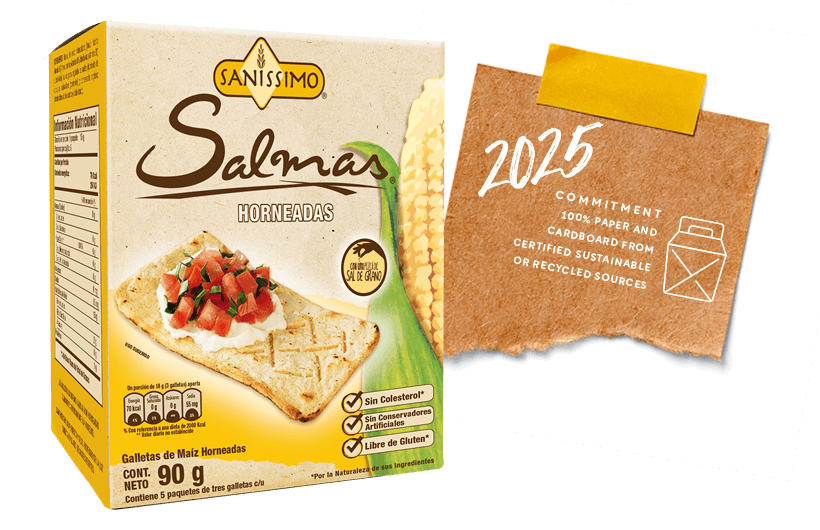

+60%
of our paper and cardboard packaging has a recognized forestry certification system or recycled source
For the second consecutive year, Grupo Bimbo has joined the CDP Supply Chain program, requesting that its suppliers, who represent 90% of our spend in packaging, to fill out the Climate Change and Forest questionnaire in which we got a response rate of 95% in the Climate Change program, and 94% regarding Forest. Grupo Bimbo was one of the top performing companies in response obtained by their supply chain in the CDP program. Over 60% or our paper and board packaging currently has a forestry certification system.
promoting post-consumption recycling
We maintain alliances to provide better disposal of our materials, thereby driving and promoting actions in favor of post-consumption recycling in the different countries where we operate taking part of the programs: ECOCE in Mexico, ECOEMBES and PONTO VERDE in Spain and Portugal, DAMF in Brazil, STEWARDSHIP in Canada, the United States with Terracycle and in Colombia and Chile we continue to participate in pilots in Alliance with the industrial cameras of these countries.
promoting post-consumption recycling
We maintain alliances to provide better disposal of our materials, thereby driving and promoting actions in favor of post-consumption recycling in the different countries where we operate taking part of the programs: ECOCE in Mexico, ECOEMBES and PONTO VERDE in Spain and Portugal, DAMF in Brazil, STEWARDSHIP in Canada, the United States with Terracycle and in Colombia and Chile we continue to participate in pilots in Alliance with the industrial cameras of these countries.
At Grupo Bimbo we are committed to taking care of the sources from which we obtain our raw materials, so we can endure and grow responsibly. This is why we work with our suppliers so they can implement actions that help to comply with our sustainability strategy. From the moment they are hired, compliance with our code of conduct is extended to all our suppliers, which encompasses subjects related to ethics, anti-corruption legislation, food quality and safety, child labor, labor conditions, and environmental regulations; this is done through the contracts which include our global integrity policy and the code of conduct for suppliers.
We are convinced that lasting relations with our suppliers based on shared principles and values is key to responsible sourcing. For several years we have been working on actions to collaborate and face the great challenges of the future, we are convinced that together we can achieve more, always working under a sustainable and regulatory compliance scheme.
As part of it in operations like Mexico, we have worked on the inclusion and development of our local suppliers. Currently, 95% of the purchases in this region is from local suppliers.
Moreover, we drive our DESEO program, which consists of a continuous training model for different subjects related to quality, food safety, occupational safety, the environment, and ethical standards in their processes, thus facilitating business management. To date, the DESEO program has 9 categories, with a total of 450 active suppliers.
450
SUPPLIERS IN THE DESEO PROGRAM
SOYABEAN
During 2020, Grupo Bimbo continued with the traceability process regarding its soybean supply chain, to identify those suppliers who may be sourcing from risk areas. It was finally determined that 11% of soybean oil potentially comes from a risk area -South America. For that volume, traceability at the crusher level is 88%.
Moreover, Grupo Bimbo has finalized the risk analysis for the supply chain of said traders, which began in 2019. Thanks to these activities, priority regions have been identified in Brazil for Grupo Bimbo’s supply chain. What is more, in the second half of 2020 sustainable soybean initiatives in Brazil were detected, which shall serve as input to evaluate the intervention in transformational projects for the coming year in these priority regions.

SOYABEAN
During 2020, Grupo Bimbo continued with the traceability process regarding its soybean supply chain, to identify those suppliers who may be sourcing from risk areas. It was finally determined that 11% of soybean oil potentially comes from a risk area -South America. For that volume, traceability at the crusher level is 88%.
Moreover, Grupo Bimbo has finalized the risk analysis for the supply chain of said traders, which began in 2019. Thanks to these activities, priority regions have been identified in Brazil for Grupo Bimbo’s supply chain. What is more, in the second half of 2020 sustainable soybean initiatives in Brazil were detected, which shall serve as input to evaluate the intervention in transformational projects for the coming year in these priority regions.
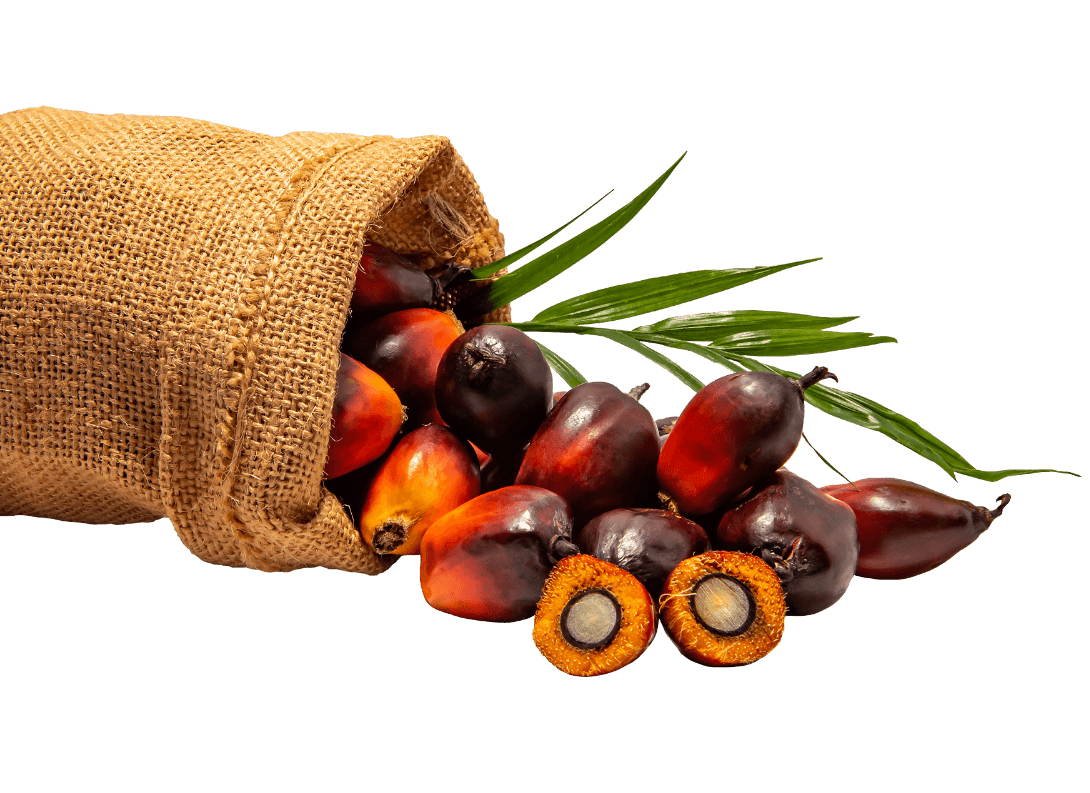
PALM OIL
This year, our focus was on 14 suppliers wo represent 96% of the total volume of palm oil. Almost the totality of this volume was traced, reaching a traceability score of 96% at the mill level. Moreover we continued working with direct suppliers to understand the progress they have made regarding the Palm Oil Policy, significant improvement has been noted at their maturity level, in addition to identifying work areas for 2021.
96%
TOTAL TRACEABILITY
AT THE MILL LEVEL
SMALL FARMERS DIRECTLY RELATED TO THE SUPPLIERS ARE NOW IN SMALL FARMER PROGRAMS
OF SUPPLIERS REPORTED THEIR PARTICIPATION IN LANDSCAPE PROJECTS
HECTARES OF FOREST ARE INCLUEDED IN THE FORESTRY CONSERVATION ACTIVITIES OF THEIR COMPANY OR OF THIRD PARTIES
ASSESSMENT OF LABOR ISSUES IN THE
CHAIN SUPPLY OF PALM OIL
In 2019 a materiality study on agricultural supply chains was conducted, including palm oil. In response, Grupo Bimbo has conducted a labor risk analysis of its palm oil supply chain in Latin America to better understand the challenges faced by the suppliers in this region. The next step was to analyze future collaboration on these challenges, together with the supply chain.
EVALUACIÓN OF LABOR ISSUES IN THE PALM
OIL SUPPLY CHAIN
In 2019 a materiality study on agricultural supply chains was conducted, including palm oil. In response, Grupo Bimbo has conducted a labor risk analysis of its palm oil supply chain in Latin America to better understand the challenges faced by the suppliers in this region. The next step was to analyze future collaboration on these challenges, together with the supply chain.
Implementation of transformation projects
Grupo Bimbo has continued with its follow-up on field work, investment continued in two landscape projects in the state of Chiapas, which is in southeastern Mexico. This region is a priority because over 70% of the palm oil for Grupo Bimbo comes from Latin America, and it is necessary to generate solutions for preventing deforestation within a context of small farmers, and improve the means of life for the farmers.
Despite the emergency situation caused by COVID-19, the pilot program for High Carbon Reserves regarding small farmers has continued, approaching the municipality of Marqués de Comillas and Benemérito de las Américas -one of the areas with the greatest deforestation risk in Mesoamerica-. As well as the project in the biosphere reserve, La Encrucijada, where the expanding agricultural activities threatens critical habitats for mangroves and wetlands. This project focuses on protecting native ecosystems and improving the lives of the farmers.
15ha
OF REPLANTED NATIVE SPECIES
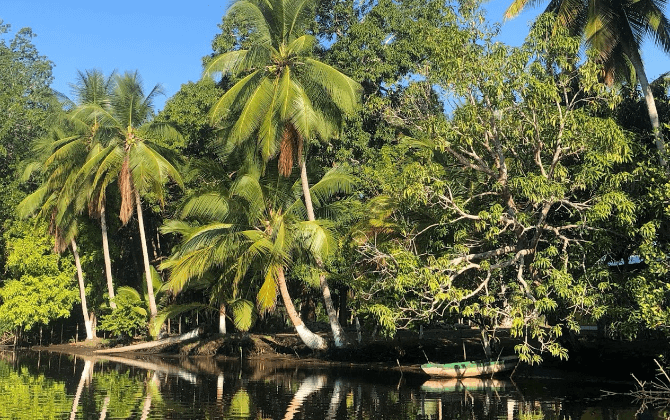
At Grupo Bimbo the pilot program for sustainable agriculture, which has regenerative agriculture as the goal, we have projects to produce raw materials: Bimbo Sustainable Maize and Bimbo Sustainable Wheat. We collaborate with CIMMyT (International Center for the Improvement of Maize and Wheat), where the goal is to strengthen Mexican farmland, consolidating the value chain while seeking to introduce sustainable practices and technologies that generate economic benefits for the farmer, through cost reductions and resource efficiency during production, contributing to improve the farmer´s well-being, their families and their communities.
Among the sustainability practices promoted with this project are the reduction of soil tillage, the integrated management of pests, diseases and weed, crop rotation, and the use of cover crops, which are an important part of what is known as Regenerative Agriculture.
At Grupo Bimbo the pilot program for sustainable agriculture, which has regenerative agriculture as the goal, we have projects to produce raw materials: Bimbo Sustainable Maize and Bimbo Sustainable Wheat. We collaborate with CIMMyT (International Center for the Improvement of Maize and Wheat), where the goal is to strengthen Mexican farmland, consolidating the value chain while seeking to introduce sustainable practices and technologies that generate economic benefits for the farmer, through cost reductions and resource efficiency during production, contributing to improve the farmer´s well-being, their families and their communities.
Among the sustainability practices promoted with this project are the reduction of soil tillage, the integrated management of pests, diseases and weed, crop rotation, and the use of cover crops, which are an important part of what is known as Regenerative Agriculture.
SUSTAINABLE POTATO
Our potato suppliers in Mexico are currently undergoing Global GAP certification. In 2020, a total of 17% of potato purchased by GB for salty snack production by Barcel had Global GAP certification, with the remaining suppliers completing certification in 2021.
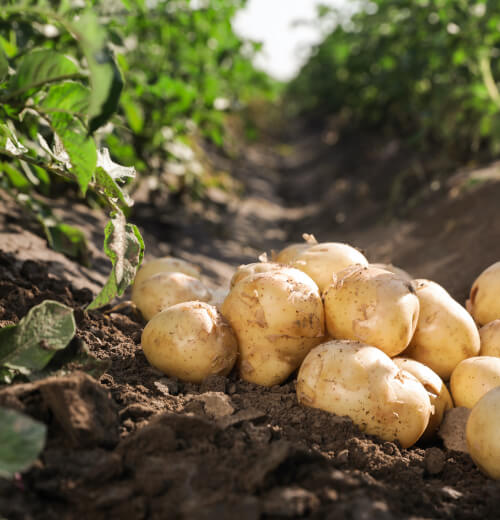
SUSTAINABLE POTATO
Our potato suppliers in Mexico are currently undergoing Global GAP certification. In 2020, a total of 17% of potato purchased by GB for salty snack production by Barcel had Global GAP certification, with the remaining suppliers completing certification in 2021.
Reforestation 2020
In light of the global pandemic and social lockdown, company volunteerism activities have been restricted in continued participation and support of reforestation activities we conduct each year to restore our forests and drive contact and interaction with Nature. Nonetheless, during 2020 we explored new ways to continue supporting reforestation within GB activities.
Our annual Global Business Meeting -held digitally- was carbon neutral because we offset CO2e emissions generated during the meeting. To offset the carbon footprint of the meeting, one hectare was reforested with 800 pine trees.
TEEB Agri-food
In follow-up to the pilot program conducted in 2019 regarding the application of the Natural Capital Protocol, thereby facilitating the incorporation of biodiversity into business decisions, during 2020 we participated in TEEB AgriFood (The Economics of Ecosystems and Biodiversity for Agriculture & Food) global project. It was organized by the UNEP (The United Nations Environment Programme); the Capitals Coalition; AMEBIN (The Mexican Alliance for Biodiversity); and the GIZ (German Development Agency) initiative -Incorporating Biodiversity into Agriculture. The purpose was to have a five-month series of training sessions to apply an evaluation framework/methodology for agri-food evaluation, which is to help companies identify, measure and assess their impact and dependency on natural, social and human capital.
Since our very beginning, we at Grupo Bimbo have worked to grow sustainably, without leaving a footprint, and therefore our waste management strategy encompasses several stages and strategic materials, adopting sustainable consumption measures, and driving actions to manage all our wastes responsibly.
These waste management strategies are applied to all waste we generate during our processes pursuant to each country’s legislation and classification, thereby ensuring that correct handling, transportation and final disposal of each type of waste is performed.

We have achieved 95% recycling in our operations worldwide; 53 of our global plants have accomplished “zero waste to landfill.” We have practices in our operations to reduce and increase recycling of our waste, and also promoting circular economies with our suppliers.
95%
RECYCLING IN OUR OPERATIONS

During 2020 we continued working on the initiative "War on waste" (WOW) in the manufacturing facilities achieving 89% of implementation.
The Business Units with the higher reduction compared to 2019 are:
CENTRAL AMERICA
32%
MEXICO
16%
CANADA
7%
SOUTH AMERICA
7%
RICOLINO
5%
We are convinced climate change is not a natural cycle for the planet, nor are the overly warm and cold seasons that occur every so often. Rather they are a serious problem threatening both the planet and all life on it. Moreover, we know it is the work of everyone to prevent it.
Therefore, we at Grupo Bimbo focus on two lines of action, pursuing greater efficiency in our value chain, reducing our energy and fuel use by following best practices and applying new technologies. Likewise, we encourage the use of renewable power sources and alternative fuels that reduce impact.
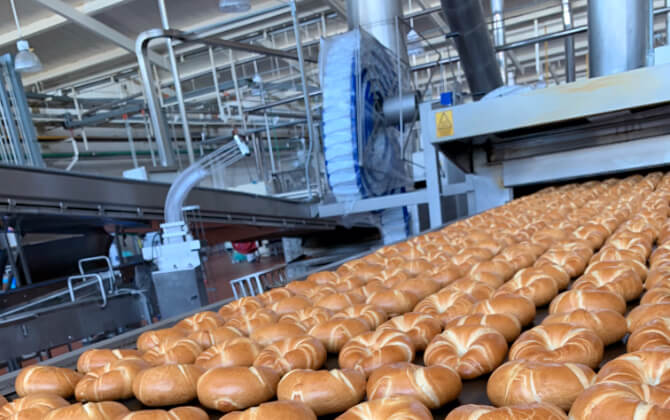
Energy Efficiency
As part of our energy efficiency standards we have two lists of mandatory practices to evaluate and implement in all our bakeries. The first one is a list of Mandatory Practices in Asset Management. It has a total of 204 practices, divided according to the environmental impact involved: 71 for electricity; 71 for water; and 62 for gas, prioritizing the impact level and difficulty in creating a path along which any new incorporation can be included.
The second, is a list of Sustainable Standards for new projects. It encompasses the minimum indispensable ones for any new project. This can mean from new production lines, building, extensions, or any project developed by Engineering.
-9%
EMISSION REDUCTION,
EQUIVALENT TO OVER 146,000
TONS CO2e 2020, VS. 2019
Throughout 2020 we continued working on our refrigerant strategy to gradually replace high environmental impact refrigerants for natural or with low global warming potential (GWP). As per the challenges derived from COVID19, our phase-out objectives were adjusted, being now, a gradual phase-out that will be completed as refrigeration systems in the manufacturing sites are updated. Also, we defined the baseline so we can continue tracking our progress, and currently, over a third of our refrigerants are natural.
OVER A THIRD OF
OUR REFRIGERANTS
ARE NATURAL
Internet of Things, Energy Module, a digitization initiative consolidated in 2020, is the path to follow with the incorporation of a monitoring system for efficiency variables in processes, including resource consumption as part of the module: Energy, incorporating environmental efficiency indicators in real time, at the site and production line levels.
We also implemented energy automation and monitoring systems in 103 El Globo branches, through which we achieved 14% savings on our annual electricity costs.
Renewable Power
Argentina
Wind Farm Bimbo Argentina became the first food company in that country to operate with 100% renewable electricity in 2020, supplied by three wind farms. This allowed us to avoid 14,400 tons of CO2e annually.
Mexico
Atitalaquia Plant: Storage System The first storage system with Lithium Ion batteries in Mexico was commissioned in Barcel Atitalaquia, enabling us to continue operating during any power outage.
Sales Centers: as part of our commitments, Grupo Bimbo will migrate 4,000 units of our current vehicle fleet to electric vehicles by 2024. In 2020 we retrofitted the electric facilities of 15 sales centers to receive 500 new electric vehicles powered by electricity from solar panels.
The Metropolitan Distribution Center was inaugurated in December, with the largest solar rooftop in Mexico.
80%
RENEWABLE Electricity
VS. BASELINE
Renewable Power
Argentina
Wind Farm Bimbo Argentina became the first food company in that country to operate with 100% renewable electricity in 2020, supplied by three wind farms. This allowed us to avoid 14,400 tons of CO2e annually.
Mexico
Atitalaquia Plant: Storage System The first storage system with Lithium Ion batteries in Mexico was commissioned in Barcel Atitalaquia, enabling us to continue operating during any power outage.
Sales Centers: as part of our commitments, Grupo Bimbo will migrate 4,000 units of our current vehicle fleet to electric vehicles by 2024. In 2020 we retrofitted the electric facilities of 15 sales centers to receive 500 new electric vehicles powered by electricity from solar panels.
The Metropolitan Distribution Center was inaugurated in December, with the largest solar rooftop in Mexico.
80%
RENEWABLE Electricity
VS. BASELINE
As part of our commitment to the planet at Grupo Bimbo we have focused on three lines of key actions to reduce our water footprint:
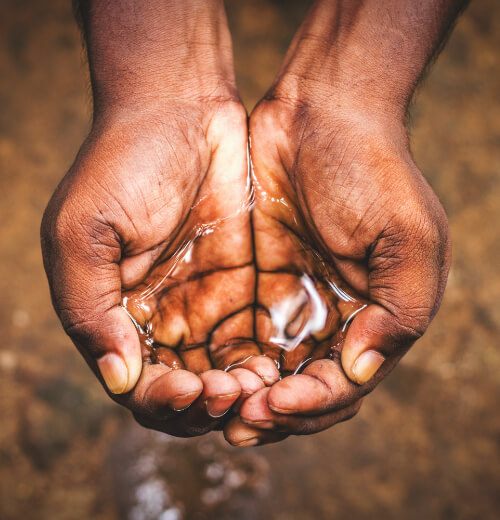
Our cleaning processes represent the principal source of water use in our work centers, and therefore we have standardized it to mitigate our environmental impact. Thanks to these standardization processes, we have currently reduced water use by 3%, as compared to 2019; we have also applied new technologies.
Consequently, in our sales and distribution centers we undertake measures to reduce our impact in the use of water. We currently have 35 rainwater catchment systems in the Sales Centers located throughout Central America.
In Mexico 95 washing arches and 234 recyclers are installed; Barcel replicated the best practice, having now 18 arches -approximately 50% of its sales centers are equipped- and 37 recyclers.
Central America has begun to replicate this best practice by installing a washing arch in one of its largest operations: Colombia. On the other hand, Brazil, the leader in dry washing, continues performing this activity in all its sales centers. This year it has been replicated in South America -Colombia and Ecuador- and in Bimbo Mexico.
1,937
TOTAL SAVINGS IN M3
IN BIMBO MEXICO
557.5
SAVINGS IN M3
IN RICOLINO MEXICO
Worldwide we have a total of 96 treatment plants that have no local infrastructure for water treatment; 49 of these plants reuse water from different activities such as irrigation, toilets, and vehicle washing, primarily in Mexico and Central America. These actions contribute 82% to the reuse of treated water.
35
RAINWATER collection
SYSTEMS IN OUR
SALES CENTERS
82
REUSE OF
TREATED WATER
Worldwide we have a total of 96 treatment plants that have no local infrastructure for water treatment; 49 of these plants reuse water from different activities such as irrigation, toilets, and vehicle washing, primarily in Mexico and Central America. These actions contribute 82% to the reuse of treated water.
35
RAINWATER collection
SYSTEMS IN OUR
SALES CENTERS
82%
REUSE OF
TREATED WATER
We have one of the largest distribution networks in the world, that is why in defining how to distribute and make the best use of our vehicles, we have incorporated logistics processes that make their operation more efficient, in addition to innovating with alternative technologies and fuels that help us further reduce our environmental impact.
Through projects such as Supply Chain Master Footprint and Max Cube, we strive to optimize our distribution and better leverage our transportation to its maximum level.
Alternative fuels and technologies for our vehicles
We seek to make inroads on our journey to be being a sustainable, highly productive and deeply humane company through the development of electric vehicles that use alternative fuels, and technologies that allow our vehicles to have a lesser impact regarding atmospheric emissions. With Grupo Bimbo’s alternative fleet, we were able to produce 6,127 MT less of CO2.
In Mexico we are committed to grow our delivery fleet by 4,000 electric vehicles, our operations in Mexico already have 1,000 electric vehicles, thus doubling the amount we had last year. Likewise, 19% of our delivery fleet has particle-filtering technology.
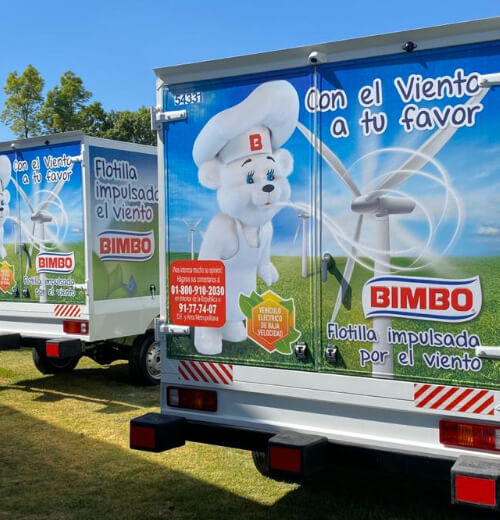
Each day we make the effort of including environment-friendly alternatives in our distribution. By late 2020 our alternative fuel inventory was as follows:
We create synergy with other organizations as additional alternatives to reducing our distribution carbon footprint, thus establishing strategies to optimize the distribution of our products and raw materials. This gives rise to the intermodal transportation projects, where we not only have been able to reduce our carbon footprint by using sea and railroad transportation, but also considerable savings as well. To date, the business units that are part of this include Mexico, Canada, Central America, and the expectation of including the USA by early 2021.

+23.9%
VEHICLES WITH ALTERNATIVE FUELS VS. 2019
9,960
TONS OF CO2 PREVENTED
THROUGH THE INTERMODAL PROJECT
1,025
VEHICLES WITH EUROPEAN TECHNOLOGY IN OPERATION THROUGHOUT LATIN AMERICA
At Grupo Bimbo, we are committed to take the necessary actions to ensure that our establishments have a positive impact on the environment. This mission is established so that all Grupo Bimbo Sales Centers and Distribution Centers worldwide meet with the non-negotiable minimum requirements to be sustainable buildings. For this, Grupo Bimbo has a continuous monitoring of all its Sales Centers with an evaluation, which is performed on an internal digital platform, which measures their sustainability maturity level according to the company's standards. The evaluation shows the strengths and areas of opportunity of each establishment and allows us to have a specific work plan to improve and increase their level of maturity and make them more sustainable.
At Grupo Bimbo, we are committed to take the necessary actions to ensure that our establishments have a positive impact on the environment. This mission is established so that all Grupo Bimbo Sales Centers and Distribution Centers worldwide meet with the non-negotiable minimum requirements to be sustainable buildings. For this, Grupo Bimbo has a continuous monitoring of all its Sales Centers with an evaluation, which is performed on an internal digital platform, which measures their sustainability maturity level according to the company's standards. The evaluation shows the strengths and areas of opportunity of each establishment and allows us to have a specific work plan to improve and increase their level of maturity and make them more sustainable.